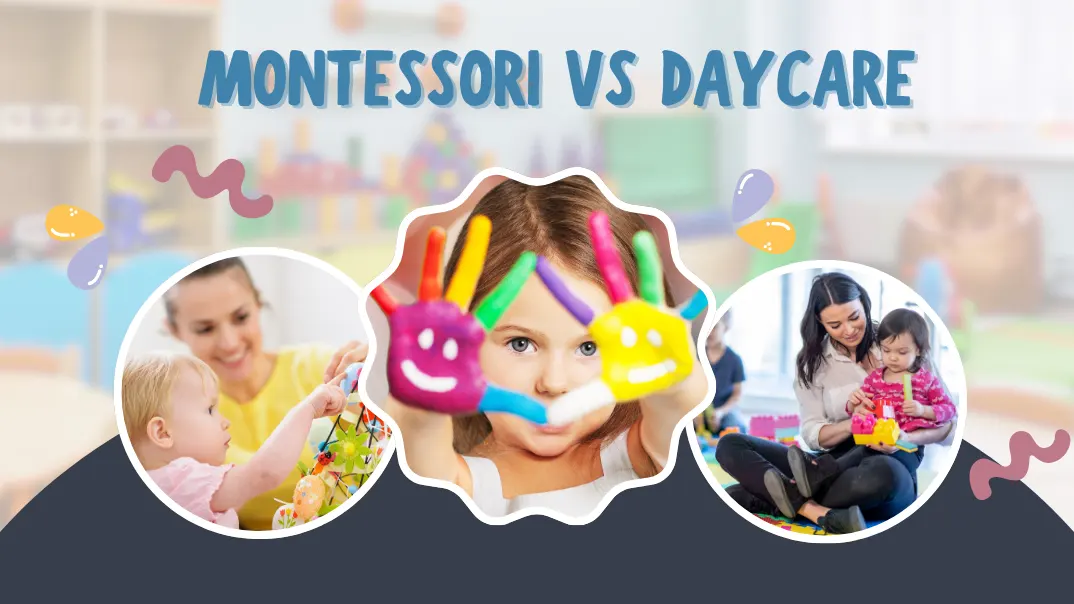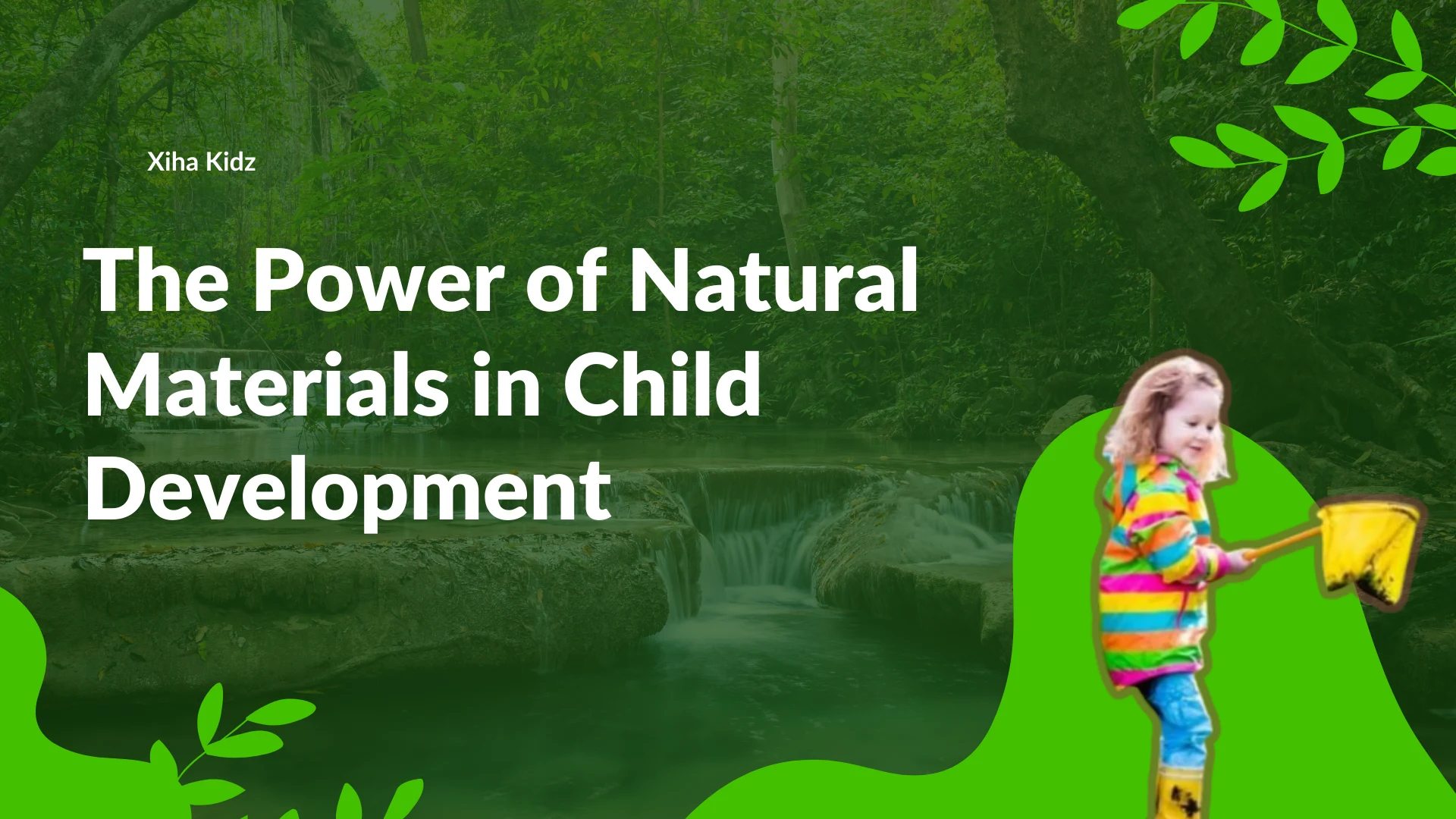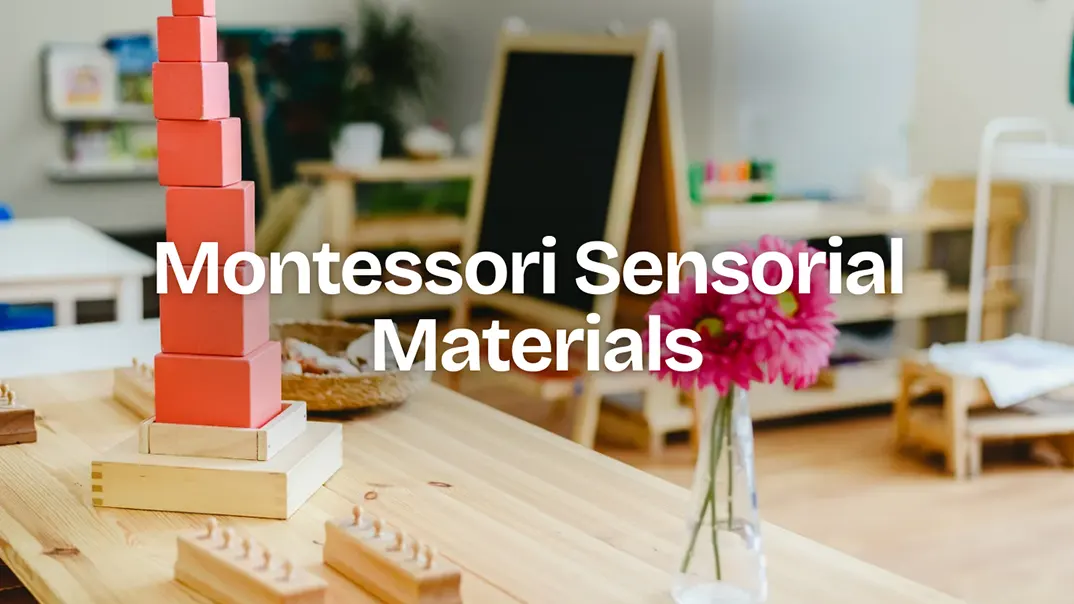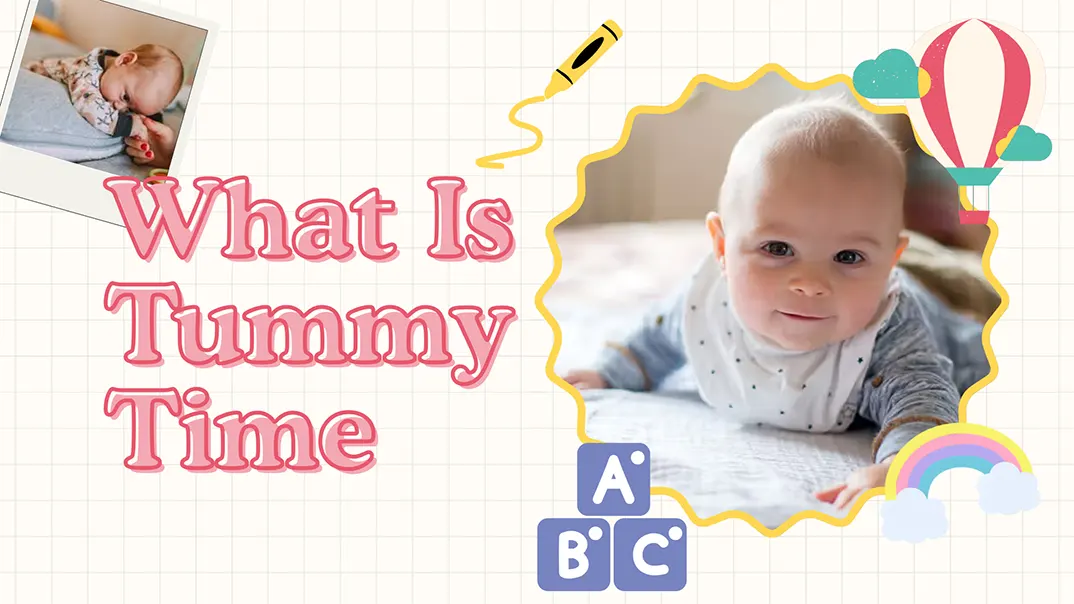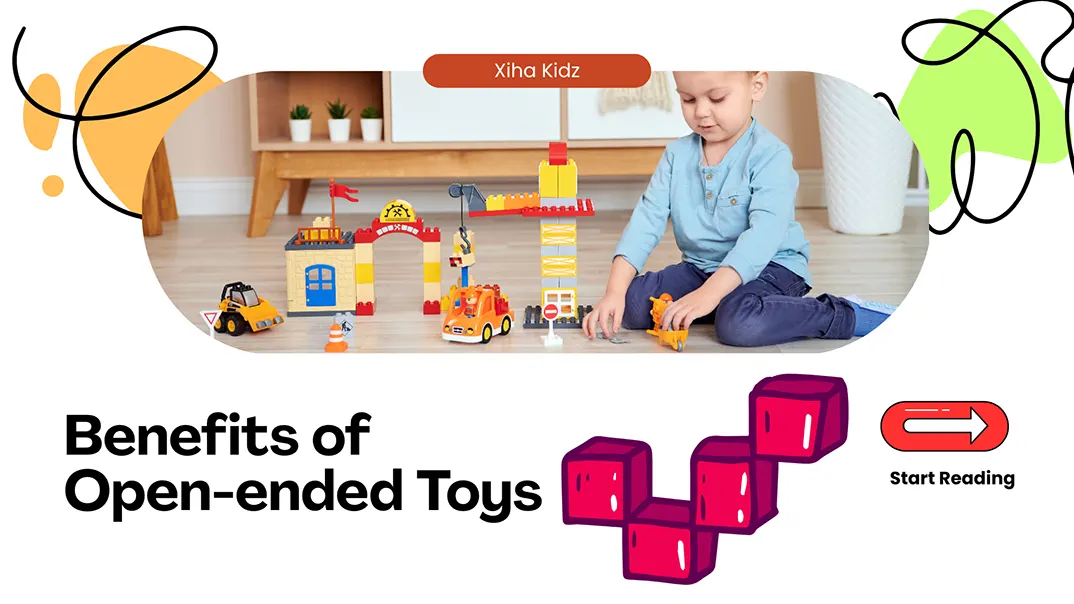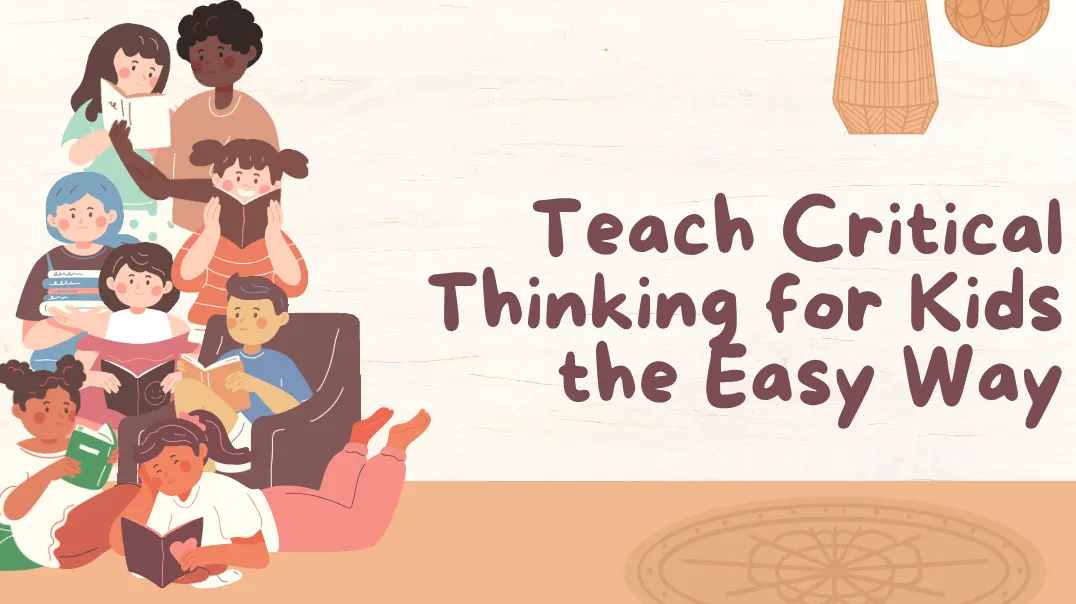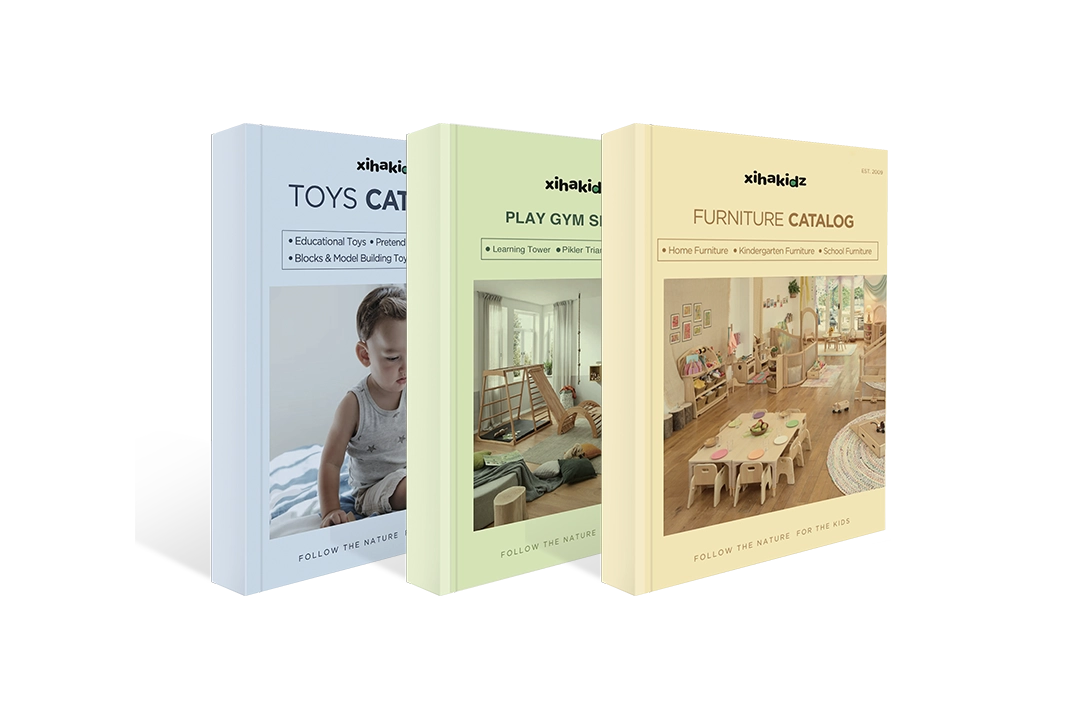Parents often face a tough decision regarding early childhood education: Montessori vs daycare. Both options provide opportunities for children to grow, learn, and develop. However, they offer very different approaches to child care and education.
Montessori focuses on self-directed learning in a structured yet flexible environment, emphasizing independence, creativity, and children’s natural curiosity. On the other hand, daycare centers are typically more focused on supervision, basic care, and social development. While Montessori programs are educational, daycare is often considered more of a caregiving service with varying levels of educational content, depending on the provider.
In this post, we will explore the differences between Montessori school vs daycare, discuss the advantages of each, and help you make an informed choice for your child.
What Is Montessori?
Montessori is an educational philosophy that encourages children to learn independently through hands-on activities. Developed by Dr. Maria Montessori in the early 1900s, this approach emphasizes respect for the child’s natural development and a structured environment that promotes self-learning.
In a Montessori setting, children engage in self-directed learning with specialized materials designed to foster cognitive, emotional, and physical development. Teachers act as guides, stepping in only when necessary, which allows children to take ownership of their learning process.
5 Core Components of Montessori Education
- Trained Montessori Teachers: Teachers act as guides, observing and supporting each child’s individual learning needs rather than traditional instruction.
- The Multi-Age Classroom: Children of various ages learn together, encouraging peer collaboration and mentorship, with older children guiding younger ones.
- Using Montessori Materials: Specialized, hands-on learning materials help children learn through sensory exploration and promote cognitive development in areas like math, language, and practical life skills.
- Child-Directed Work: Children choose their activities based on their interests, fostering intrinsic motivation, independence, and a sense of responsibility for their learning.
- Uninterrupted Work Periods: Extended periods of focused work allow children to engage deeply in tasks, develop concentration, and complete work without distractions.
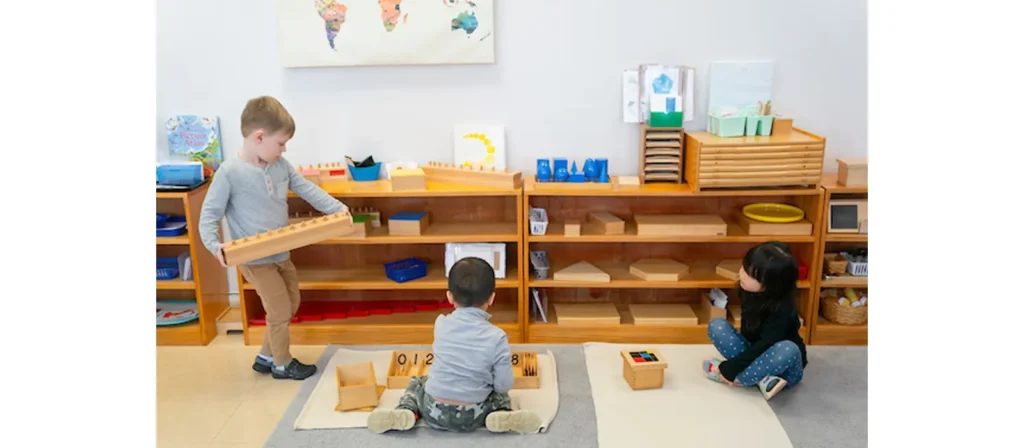
What Is Daycare?
Daycare, on the other hand, refers to a more general form of childcare where children are cared for during the day by trained professionals. While some daycare centers incorporate educational elements into their programs, they primarily focus on providing safe, supervised care and social opportunities.
In a traditional daycare setting, the focus is primarily on the child’s safety, supervision, and basic well-being. The environment is generally more structured and less individualized compared to the Montessori approach. Daycares may follow a set curriculum, but the approach is typically more directive, with caregivers leading the children through activities, lessons, and play.
Key Aspects of Daycare
- Care and Supervision: Daycare focuses on caring for children while parents work, ensuring safety and socialization.
- Flexible Routine: The daily schedule includes playtime, snacks, and naps, with some basic educational activities.
- Less Academic Focus: Compared to Montessori daycare vs regular daycare, daycares typically offer fewer formal educational opportunities.
- Socialization: Children interact with their peers, learning vital social skills through play.
Montessori vs Daycare: What Are Their Similarities?
Despite their differences in educational approach and classroom design, Montessori and daycare programs have overlapping objectives regarding early childhood development. Here’s a closer look at their core similarities:
Focus on Early Childhood Development
Montessori and daycare aim to support young children’s physical, emotional, social, and cognitive development. Both environments are designed to help children reach important developmental milestones appropriate for their age group, whether through structured lessons or play-based interactions.
Emphasis on Socialization
Social interaction is a fundamental component in both settings. Children are encouraged to play, cooperate, and communicate with peers, helping them develop critical social skills such as empathy, sharing, listening, and resolving conflicts. While the method of interaction may vary, the goal of nurturing social growth is shared.
Safe and Supervised Environment
A safe, nurturing, and supportive space is a top priority in Montessori and daycare. Caregivers and teachers are responsible for maintaining children’s physical safety, offering emotional support, and guiding behavior in age-appropriate ways.
Professional Childcare Staff
Both environments employ trained professionals who understand child development. While Montessori teachers often receive specialized Montessori certification, and daycare staff may have early childhood education training, both are equipped to support children’s well-being, learning, and emotional needs.
Preparation for School Readiness
While Montessori emphasizes academic and life skills through self-directed learning, and daycare introduces school-like routines through group activities, both aim to prepare children for future schooling. Each provides opportunities for children to develop basic skills such as following instructions, listening, and participating in group settings, essential for a smooth transition to kindergarten or elementary school.
Encouragement of Exploration and Curiosity
In both Montessori and daycare, children are given space to explore, experiment, and engage with the world around them. Whether through imaginative play or guided activities, curiosity is encouraged, and children are supported as they discover how things work.
Supportive for Working Families
Both options serve as reliable childcare solutions for working parents, offering full-day or part-time programs that allow parents to maintain their routines while ensuring their children are cared for in a stimulating environment.
Differences Between Montessori vs Daycare
When parents consider Montessori vs daycare, the differences between these two early childhood care options are profound, spanning various aspects of education and child development. Below, we summarize the core differences under specific categories for a clear comparison.
1. Educational Philosophy
Montessori: Montessori education is rooted in a child-centered philosophy that encourages self-directed learning, exploration, and independent discovery. Children are provided with a variety of carefully selected learning materials and given the freedom to choose activities based on their interests. The Montessori method emphasizes hands-on learning, where children actively engage with materials to develop cognitive, social, and practical skills. The approach fosters critical thinking, independence, and a lifelong passion for learning.
Daycare: Daycare primarily focuses on providing a safe, supervised environment for children while their parents are away. While daycare centers may offer some early childhood education, the emphasis is mainly on care, supervision, and socialization. Activities are more group-based and structured, with a less individualized focus. The primary goal is to ensure that children are cared for, safe, and engaged while developing their basic social, cognitive, and motor skills.
2. Curriculum and Academic Focus
Montessori: Montessori education focuses on academic growth through practical and experiential learning. The curriculum encompasses subjects such as language, mathematics, geography, science, and cultural studies. Each area is taught with hands-on materials that help children understand abstract concepts through concrete experiences. Montessori encourages children to master concepts before moving on to more advanced topics.
Daycare: In daycare, the curriculum tends to be more general and informal, focusing on basic developmental milestones, including socialization, motor skills, and cognitive abilities. While some daycare centers may introduce early literacy and numeracy, the primary goal is not to provide deep academic instruction but to foster a safe and playful environment where children can develop at their own pace.
3. Teacher’s Role
Montessori: In the Montessori approach, teachers serve as guides rather than traditional instructors. Their role is to observe and assess each child’s development, providing individualized support and resources to encourage independent learning. Teachers facilitate the environment, avoiding direct instruction unless necessary, to promote autonomy and self-motivation.
Daycare: In daycare, teachers or caregivers play a more active and hands-on role, leading activities, ensuring children follow the daily routine, and managing group dynamics. The primary responsibility is to provide structure, engage children in group activities, and manage behavior, rather than facilitating independent exploration.
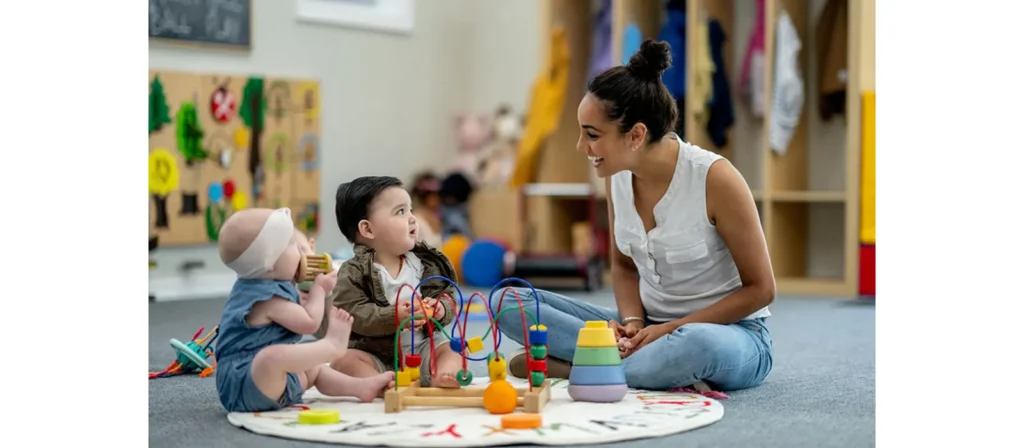
4. Environment Design
Montessori: Montessori classrooms are specifically designed to promote independence and concentration. The space is organized with child-sized furniture, shelves stocked with educational materials, and distinct areas for various learning activities. The environment encourages free movement and self-directed exploration with minimal distractions, fostering a calm and focused atmosphere.
Daycare: Daycare classrooms are typically designed for group interaction and play, featuring a variety of toys, art materials, and books that support social learning. The environment tends to be more flexible and dynamic, accommodating the needs of larger groups of children. While still safe and nurturing, daycare environments are generally less organized for individual exploration than Montessori classrooms.
Transform Your Classroom with Custom Furniture Solutions
5. Educational Materials
Montessori: Montessori classrooms are equipped with specialized, hands-on learning materials designed to engage children’s senses and encourage independent learning. These materials are self-correcting, allowing children to discover and learn from their mistakes independently. Each material has a specific purpose, ranging from practical life activities (e.g., pouring, buttoning) to more complex academic concepts, such as math or geography. The materials are organized and easily accessible, enabling children to select and work with them according to their interests, promoting self-guided learning.
Daycare: In daycare, the educational materials are more generalized and typically focus on basic developmental skills. While daycare centers provide toys, books, and art supplies, the emphasis is on play-based learning rather than structured educational activities. The materials are designed to help children develop motor skills, language, and social abilities. However, daycare materials may not be as specialized or intentional as those used in Montessori settings, and the learning experiences are generally less individualized.
6. Daily Schedule
Montessori: Montessori follows a flexible schedule with long periods of uninterrupted work time. These work periods enable children to engage deeply in activities without the disruption of constant transitions. The day is balanced with group activities and individual exploration, but children are given the flexibility to choose how they spend their time. The structure is designed to support concentration and the development of executive functioning skills.
Daycare: In daycare, the daily schedule is more rigid with set times for meals, naps, play, and group activities. Daycare centers often follow a strict routine to ensure that children receive balanced care and consistent social interactions. While this predictability is beneficial for younger children, it offers less flexibility for self-directed exploration compared to the Montessori approach.
7. Age Group
Montessori: Montessori classrooms feature mixed-age groups, typically spanning a 3-year age range. For example, children aged 3-6 years may be grouped together in the same classroom, facilitating peer learning and mentorship. Older children help guide younger children, which fosters a sense of community and allows children to progress at their own pace without being held back by age-based expectations.
Daycare: Daycare centers typically group children by age, often categorizing them into groups such as infants, toddlers, and preschoolers. This ensures that children are engaged in age-appropriate activities tailored to their developmental level. However, this system may limit opportunities for older children to mentor younger ones and reduce the collaborative, multi-age learning experience that Montessori offers.
8. Noise Level
Montessori: Montessori classrooms are intentionally quiet to promote concentration and independent work. Children are encouraged to be respectful of others’ work and maintain a calm, focused atmosphere. This quiet environment helps children develop the ability to concentrate deeply on their tasks, allowing for longer periods of sustained focus.
Daycare: Daycare environments tend to be noisier because of the large number of children and the variety of group activities. The noise level can rise significantly during group play, mealtimes, and outdoor activities. While this creates a lively and dynamic atmosphere, it can make it more challenging for children to focus or engage in individual learning.
9. Socialization and Peer Interaction
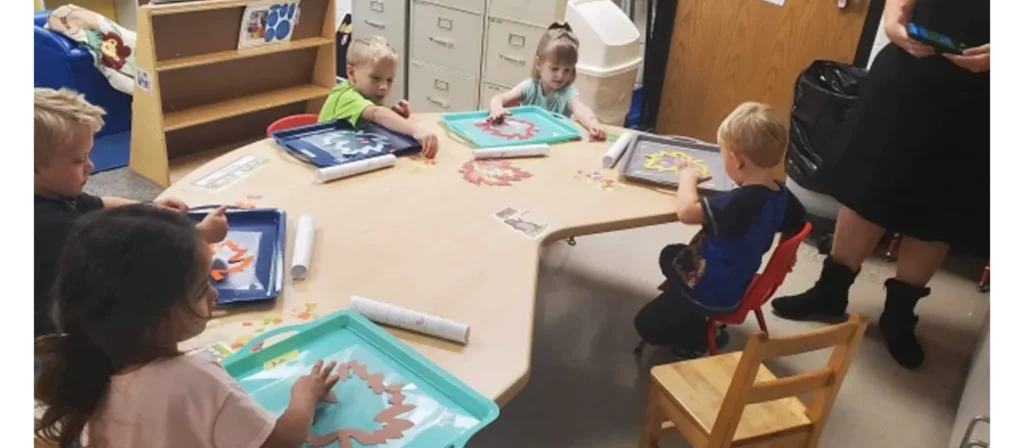
Montessori: In Montessori classrooms, peer interaction is encouraged through collaboration and shared activities. Because of the mixed-age groupings, older children often mentor younger ones, which fosters a sense of responsibility and empathy. Social learning is integral as children interact with different age groups in a non-competitive environment. This collaborative environment also allows children to observe and learn from peers at various stages of development.
Daycare: Socialization in daycare is also necessary, but children are typically grouped with peers of the same age. This can result in more intense competition and potentially less cooperation between children. Daycare centers often have structured playtimes where children interact with others of their age group, although they may have fewer opportunities for cross-age interactions than in Montessori schools.
10. Focus on Play
Montessori: In Montessori, play is integrated with learning, but it is structured around purposeful, hands-on activities that teach real-world skills. Children engage in activities that foster both cognitive and practical development, such as learning how to care for their environment, perform daily life tasks, and explore academic concepts through sensory experiences.
Daycare: In daycare, play is central to the curriculum, often as unstructured, spontaneous activities that encourage socialization and creativity. Children learn through interaction with their peers, engage in imaginative play, and participate in group games, fostering emotional and social development while supporting early cognitive skills.
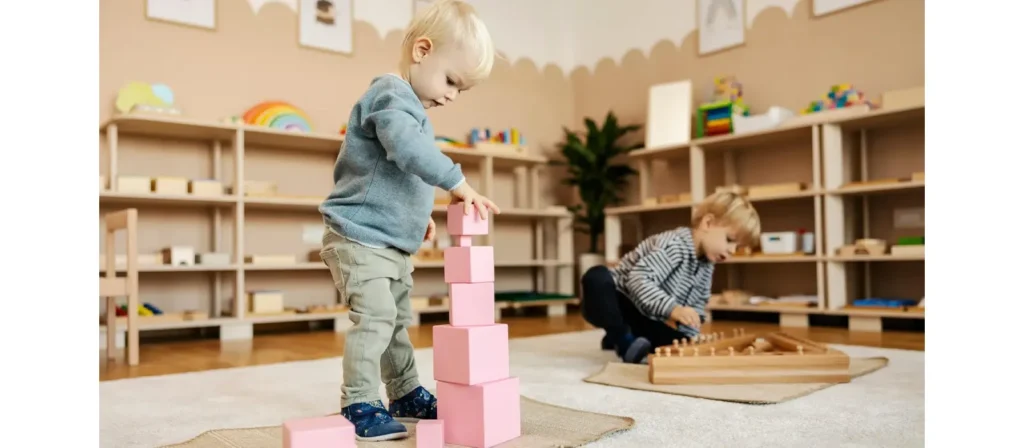
11. Freedom and Autonomy
Montessori: Montessori education emphasizes freedom and autonomy. Children can choose their activities, decide what to work on, and engage with materials at their own pace. This freedom helps build self-discipline, fosters a love of learning, and allows children to take ownership of their education.
Daycare: Daycare provides a more structured environment with set schedules for meals, naps, and activities. While some free play is allowed, the caregivers primarily direct the day. Children have less control over their daily routine, and their activities are typically planned by the daycare staff, leaving less room for individual choice.
12. Parental Involvement
Montessori: Montessori education strongly emphasizes active parental involvement in the child’s learning journey. Many Montessori programs include regular parent-teacher conferences, workshops, classroom observation opportunities, and even home-based extensions of Montessori principles. Parents are encouraged to understand the Montessori philosophy and create a consistent environment at home that mirrors the classroom’s values, promoting independence, order, and respect.
Daycare: In daycare settings, parental involvement is generally more limited and optional. Communication between caregivers and parents usually focuses on daily reports (e.g., meals, naps, behavior) and occasional events like holiday parties or progress updates. While parents are welcome to engage, they are not typically expected to adopt any specific educational approach at home or participate in the classroom environment.
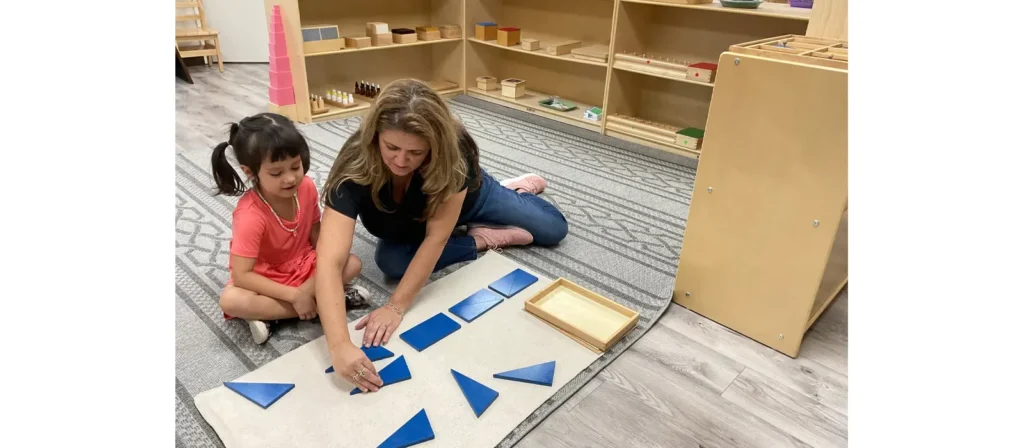
13. Cost and Accessibility
Montessori: Montessori schools are typically more expensive than daycare centers due to their specialized materials, teacher training, and individualized learning approach. The cost can be a barrier for many families. Additionally, Montessori schools are often fewer in number compared to daycare centers, making them less accessible, especially in rural or underserved areas.
Daycare: Daycare is generally more affordable and accessible, with a wide range of options available in most communities. Daycare centers offer flexible hours and pricing to accommodate working parents, making them a more practical choice for many families. The lower cost and greater availability make daycare an accessible option for parents who need reliable childcare.
Differences in Classroom Design: Montessori vs Daycare
The physical environment plays a vital role in shaping children’s early learning experiences. Both Montessori and daycare classrooms are designed to support developmentally appropriate practices, but their design philosophies differ in structure, materials, and intended outcomes. Understanding these differences can help educators, designers, and parents make informed decisions when planning or evaluating early childhood spaces.
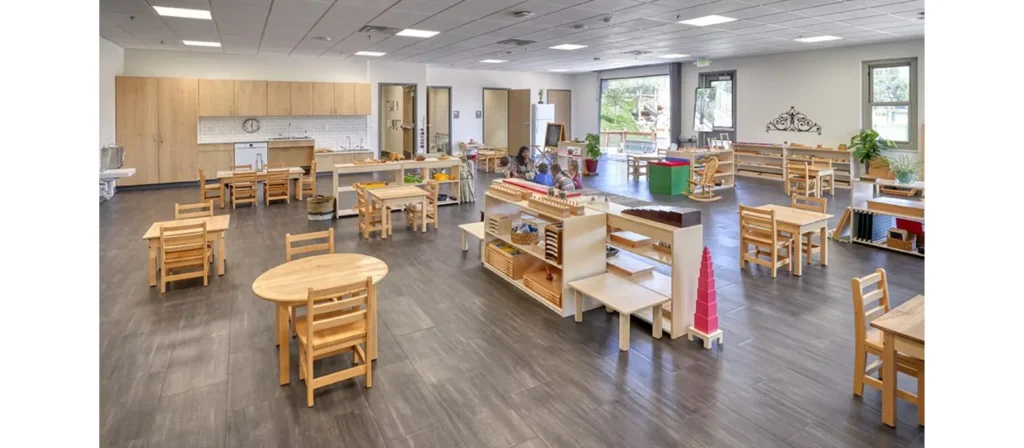
1. Layout and Spatial Arrangement
Montessori classrooms tend to feature defined learning areas such as practical life, sensorial, language, and mathematics, each with a clear purpose. The space encourages freedom of movement, order, and independent exploration, with a consistent layout that supports self-direction.
Daycare classrooms are typically designed for flexibility, often using multi-use zones for group activities, meals, play, and rest. Layouts may be adjusted throughout the day to accommodate changing routines, making them adaptable for different age groups and activity types.
2. Furniture and Materials
Montessori environments often incorporate child-sized wooden furniture and natural materials. Each item is carefully selected and displayed on open shelves to support purposeful use and foster a sense of order and care.
In daycare settings, furniture is generally chosen for durability, safety, and ease of cleaning. Materials are often more varied in form and function, and toys or learning tools may be offered in larger quantities to encourage shared use and group engagement.
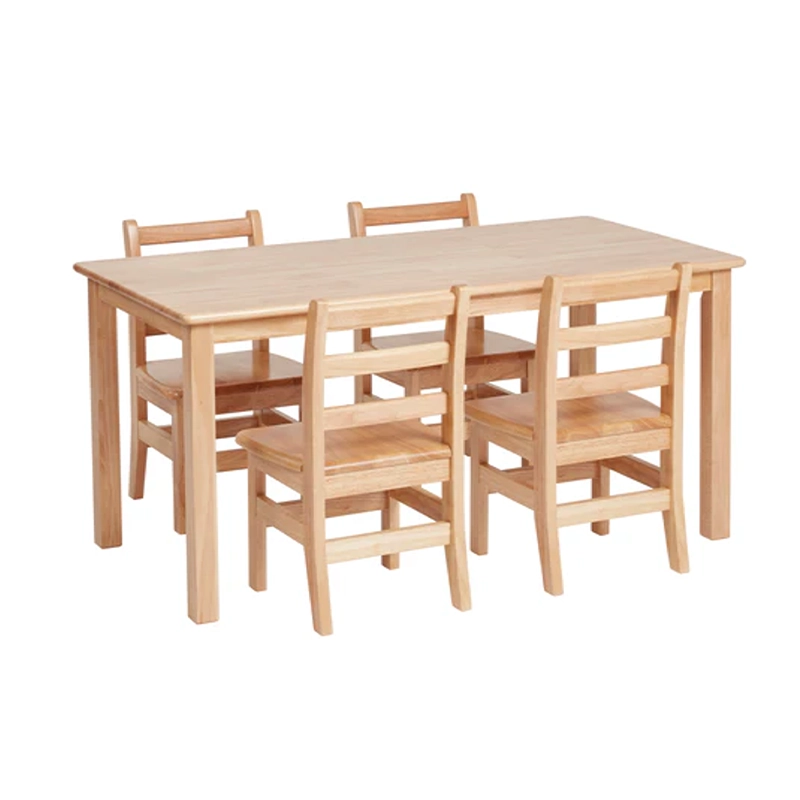
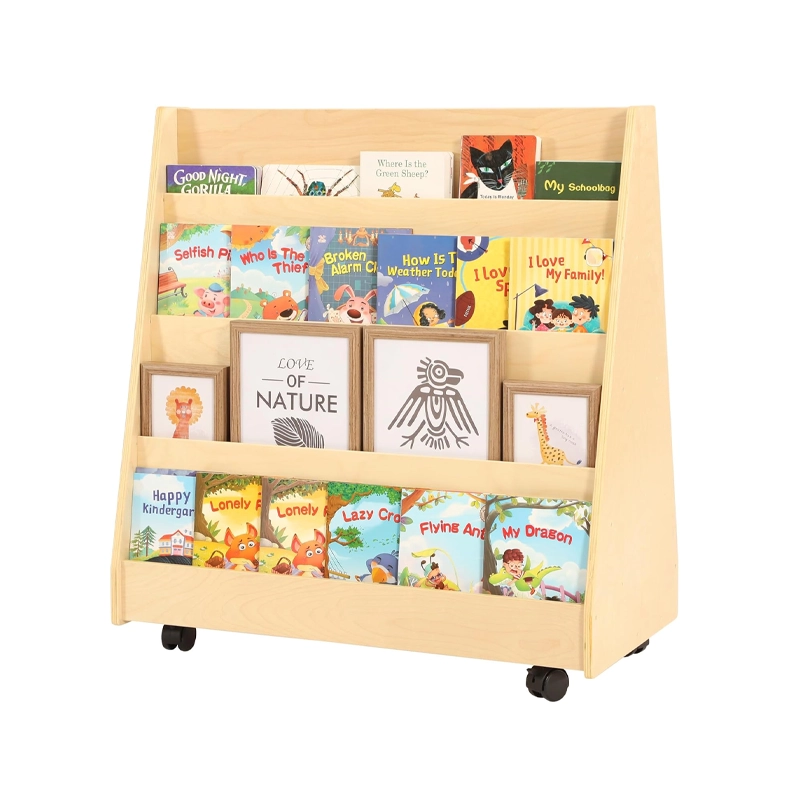

3. Visual Environment
Montessori classrooms are visually calm, often using soft tones, minimal wall displays, and carefully curated artwork or real-world imagery. The goal is to reduce distraction and support concentration.
Daycare classrooms tend to be more visually stimulating, using bright colors, themed decorations, posters, and children’s artwork to create a cheerful, engaging atmosphere. This visual richness aims to spark creativity and social energy.
4. Accessibility and Independence
In Montessori classrooms, all materials are placed within children’s reach, encouraging them to select, use, and return items independently. This setup supports self-regulation and autonomy.
While daycare classrooms also value accessibility, some resources may be stored by adults or rotated regularly for variety. The emphasis is often on shared access and teacher-guided activity, which can help with supervision and group coordination.
Discover Our Full Range of Products
Get access to our comprehensive catalog featuring top-quality furniture and play equipment for kindergartens and schools.
Pros and Cons: Montessori vs Daycare
When selecting the right early learning environment for your child, it’s important to weigh the strengths and limitations of each option. Below is a clear breakdown of the advantages and disadvantages of both Montessori and daycare settings to help you make an informed decision based on your child’s needs and your family’s priorities.
Pros and Cons of Montessori
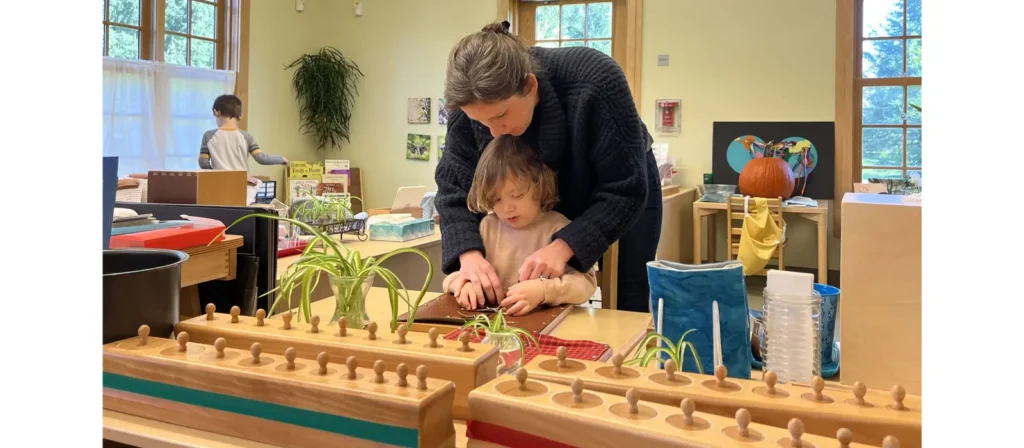
✅ Pros:
- Individualized Learning
Each child progresses at their own pace, with lessons tailored to their developmental stage and interests. - Promotes Independence
Children learn life skills and responsibility through hands-on activities and self-guided routines. - Deep Concentration & Focus
Quiet, orderly environments support sustained attention and thoughtful exploration. - Mixed-Age Classrooms
Encourages leadership, collaboration, and mentoring between older and younger children. - Strong Academic Foundation
Curriculum covers math, language, science, and cultural studies through real-world, tactile materials.
❌ Cons:
- Higher Cost
Montessori tuition is typically more expensive due to certified teachers and specialized materials. - Limited Availability
Montessori schools are less widespread than daycare centers, especially in rural or suburban areas. - Not Ideal for All Children
Highly self-directed environments may be overwhelming or unstructured for some learners.
Pros and Cons of Daycare
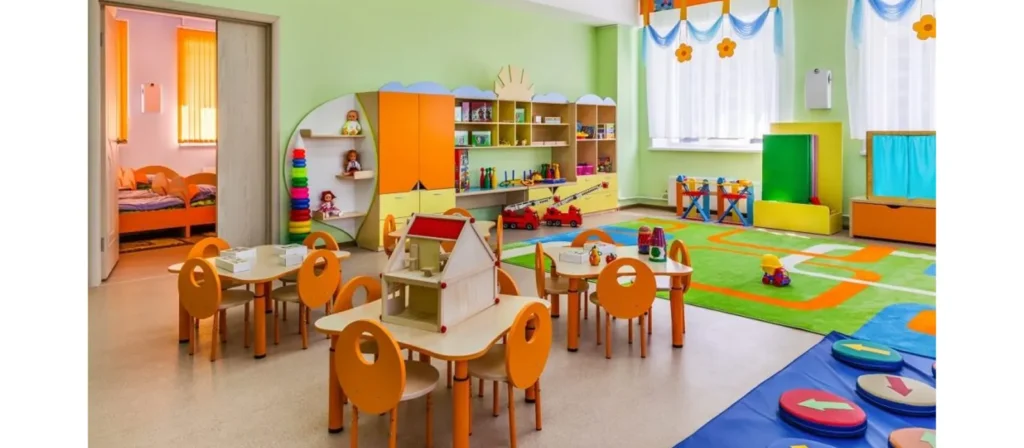
✅ Pros:
- More Affordable
Generally less expensive than Montessori, with more flexible pricing options. - Wider Availability
Daycare centers are commonly found in most communities, including urban, suburban, and rural areas. - Strong Social Interaction
Children engage with peers of the same age in group play and activities, building essential social skills. - Structured Routine
Predictable daily schedules provide comfort and rhythm for children who thrive on consistency. - Reliable Childcare Solution
Especially suitable for working families needing full-day or part-time care.
❌ Cons:
- Less Individualized Attention
Activities are typically group-based, with less emphasis on personal learning pace. - Higher Noise and Activity Levels
The environment can be more stimulating or chaotic, which may not suit all children. - Limited Academic Depth
While foundational skills are introduced, academic exploration is usually lighter and play-based.
Choosing the Right Fit for Your Child
The choice between Montessori and daycare depends largely on your child’s temperament, educational goals, and family schedule.
- Your Child’s Learning Style: Montessori may be the right choice if your child thrives in a structured environment that encourages independence. If they benefit from socialization and more flexible routines, daycare may be a better option.
- Family Values and Goals: Montessori fosters independence and academic growth, while daycare focuses more on care and social interaction.
- Cost and Accessibility: Montessori programs may be more expensive and harder to find, while daycares are more widely available and flexible.
Conclusion
Montessori and daycare offer distinct advantages, and there is no one-size-fits-all answer. The Montessori method could be best if you value a highly structured educational approach that encourages independent learning. If your primary concern is ensuring your child is cared for in a safe environment while socializing with other children, daycare might be a more practical choice.
Ultimately, the best option depends on your family’s priorities, your child’s personality, and long-term educational goals. By carefully considering all factors, you can make an informed decision supporting your child’s development in the best way for them.

